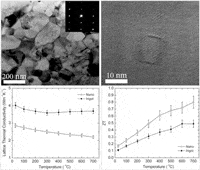 Thermoelectric materials hold great promise for turning waste heat back into useful power and are touted for use in hybrid cars, new and efficient refrigerators, and other cooling or heating applications. However, they are very inefficient so researchers have to find ways of boosting the performance of thermoelectric materials by separating the electrical and thermal conductivity properties. Using a nanocomposite approach, Xiao Yan, a research associate in the Department of Physics at Boston College, together with collaborators from MIT, managed to increase the peak ZT from 0.5 (for bulk ingot) to 0.8 (the team’s nanostructured sample) at 700 °C. At medium temperatures, they even were able to reach improvements of up to 90%.
Thermoelectric materials hold great promise for turning waste heat back into useful power and are touted for use in hybrid cars, new and efficient refrigerators, and other cooling or heating applications. However, they are very inefficient so researchers have to find ways of boosting the performance of thermoelectric materials by separating the electrical and thermal conductivity properties. Using a nanocomposite approach, Xiao Yan, a research associate in the Department of Physics at Boston College, together with collaborators from MIT, managed to increase the peak ZT from 0.5 (for bulk ingot) to 0.8 (the team’s nanostructured sample) at 700 °C. At medium temperatures, they even were able to reach improvements of up to 90%.
Nanocomposite Approach Enhances Thermoelectric Materials





